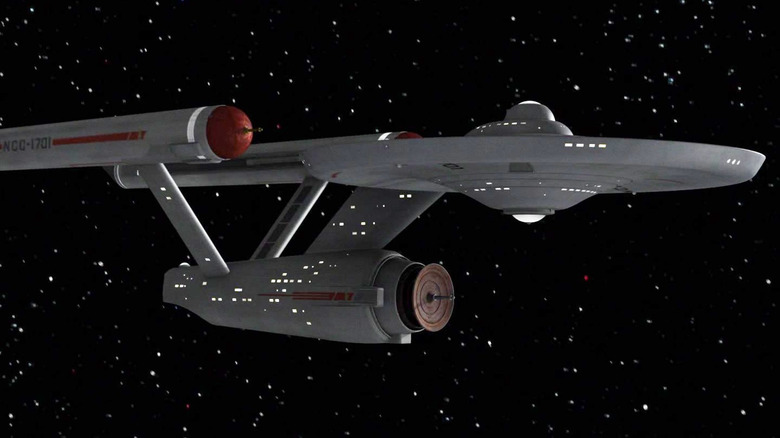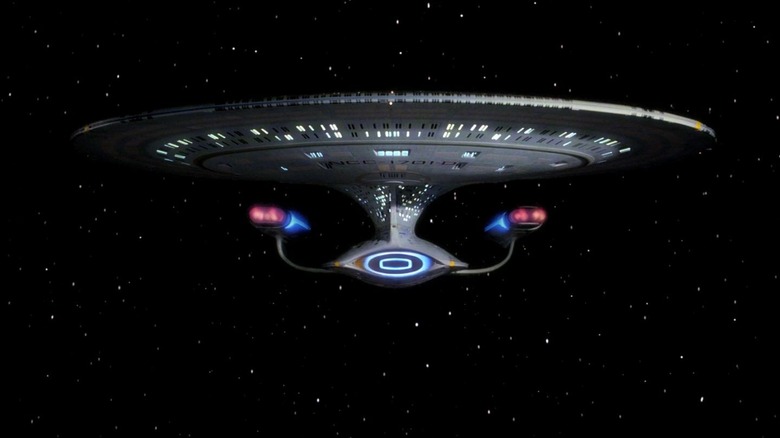Star Trek's Starship Enterprise Originally Had A Very Different Name
It's difficult to imagine a version of "Star Trek" wherein the central starship was not called the Enterprise. And "Enterprise" is, of course, a fantastic name for a starship living in an egalitarian, utopian future of togetherness and global unity. For one, the name is conceptual; it's not named after anything on Earth, eschewing any geocentricity. "Star Trek" can too often be geocentric, concerned more with the plight and personal details of humans and Earth than of its alien characters or their respective homeworlds. "Enterprise" ensures an element of neutrality.
Also, an "enterprise" is a grand thing to undertake. The name implies that the ship is on an active mission. The ship is not called the USS Complacency. Additionally, the abstract noun "enterprise" doesn't bear any kind of jingoistic underpinnings. Had the ship been called, say, the USS Freedom or even the USS Independence, it would feel markedly American. Not that the United States has a copyright on the words "freedom" and "independence," but those words are typically used in this country's unique brand of brazen, dull, ultra-patriotic rhetoric. "Star Trek" creator Gene Roddenberry didn't want his show to vaunt America. He wanted it to vaunt humanity.
But that wasn't always the case. In the early days of development, while Roddenberry was still inventing the names of the characters and starships in "Star Trek," he briefly envisioned a spacecraft called the USS Yorktown. This was a name taken from the real-life WWII-era aircraft carrier, originally commissioned in 1937. The Yorktown sunk at the battle of Midway in 1942 and remains on the floor of the Pacific Ocean.
It wasn't until Roddenberry learned about another real-life WWII-era aircraft carrier that he renamed his fictional starship the USS Enterprise.
The USS Enterprise was named after a real aircraft carrier
The real USS Enterprise served at the same time as the Yorktown, commissioned in 1938. It fought mostly in the Asia-Pacific war and, unlike the Yorktown, survived the conflict. It was one of only three ships to do so. The Enterprise was decommissioned in 1947. Roddenberry liked the story of the Enterprise, and traded out the name.
The name Yorktown did end up appearing in "Star Trek," having been applied to a noted support craft. A USS Yorktown was mentioned in the original series episode "Obsession" (December 15, 1967), and it was presumably the same Yorktown that found itself under attack by a massive space probe in "Star Trek IV: The Voyage Home." Yorktown was also the name of the gigantic, ring-like space station in the 2016 film "Star Trek Beyond." If one looks closely, one can also see ships called Yorktown on manifests or merely sailing by in the background on "Star Trek: The Next Generation" and "Star Trek: Picard," respectively.
"Enterprise," sadly, wasn't able to fully escape its American origins. It's stated repeatedly throughout the original "Star Trek" series that the ship is a Constitution-class vessel. And while the word "constitution" does mean the same thing as fortitude, American viewers will likely think just as much of the United States Constitution, one of the nation's founding documents. Also, the ship is called the U.S.S. Enterprise and those first three letters are also American-inflected. In the canon of "Star Trek," USS stands for United Starship, but USS also happens to stand for United States Ship in the modern navy.
In "Star Trek: The Next Generation," the nomenclature was altered slightly to be more neutral. The Enterprise-D is a Galaxy-class starship.

